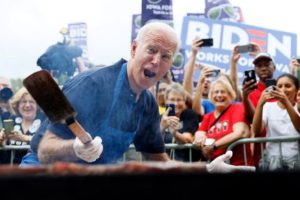Iowa Now On the Bubble
The DNC is now considering what to do about Iowa in terms of where it sits in the order of presidential primaries, since it is traditionally first to go in the presidential race every 4 years. My opinion? Dump it. The unmitigated shitshow of 2020’s caucuses should be the nail in the coffin of Number One Primary, but it goes beyond that. Iowa voters are not  predictive of a winner; its population is older, more rural, and generally less informed than many other states. As an aside, I even question the importance of New Hampshire, but whatever, let’s dump on Iowa tonight. I’ve got an idea, how about we start out with Super Tuesday and just go from there?
predictive of a winner; its population is older, more rural, and generally less informed than many other states. As an aside, I even question the importance of New Hampshire, but whatever, let’s dump on Iowa tonight. I’ve got an idea, how about we start out with Super Tuesday and just go from there?
There’s also other upsides to dumping Iowa; no more stupid steak fries, corn on the cob roasts, butter cow sculpture contests, and hundreds of thousands of dollars spent on bus rentals going from VFW hall to VFW hall to press the flesh of octogenarians. On top of that, the Iowa Dems can’t even manage implementing a Goddam iPad app, hence 2020’s disaster. In short, fuck those hayseeds. Go to the back of the line; sit down, shut up. Eat your corn.
Not that I’m opinionated. Or worn out. Or just sick of hearing about Iowa. Rant over, good night.